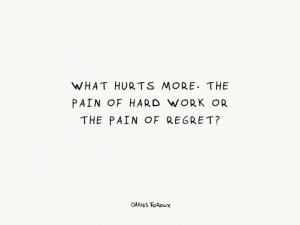

When you neglect something towards someone, isn’t regret a normal human emotion that overwhelms you? Even for something small or ordinary, don’t you feel like you’re shortchanging someone? A person deserves to be treated fairly.
Wanneer je iets nalaat ten opzichtig van iemand, is spijt dan niet een normaal menselijk gevoel die je overvalt? Ook voor iets kleins of heel gewoon, krijg je dan niet het gevoel dat je iemand te kort doet?
Een mens verdient om fair behandelt te worden.
The concept of “regret” generally refers to the feeling of sorrow, disappointment, or remorse that arises when one feels dissatisfaction or disappointment about a past decision, action, or situation. The key points related to regret can include:
Decision or action: Regret may arise from making a decision or taking an action that did not yield the desired outcome, leading to a sense of disappointment or dissatisfaction.
Inaction: Regret can also stem from not taking action or missed opportunities, resulting in feelings of remorse or a sense of having missed out on something.
Hindsight bias: Regret can be influenced by hindsight bias, where one judges past decisions or actions based on the knowledge or information available in the present, rather than the circumstances or knowledge available at the time of the decision or action.
Emotional impact: Regret often involves an emotional response, such as sadness, disappointment, guilt, or shame, and can affect one’s mental well-being and outlook on life.
Lessons learned: Regret can sometimes serve as a valuable learning experience, allowing individuals to reflect on their past decisions or actions and make better choices in the future.
Coping strategies: Individuals may develop various coping strategies to deal with regret, such as acceptance, forgiveness (of oneself or others), self-reflection, problem-solving, or seeking support from others.
Personal perspective: Regret is subjective and can vary greatly depending on an individual’s values, beliefs, and life experiences. What one person may regret, another person may not, and vice versa.
It’s important to note that regret is a normal human emotion and can be a part of the human experience. It can offer opportunities for reflection, growth, and self-improvement. However, dwelling on regret excessively or for prolonged periods of time can negatively impact one’s mental health and well-being. If you’re struggling with regret or related emotions, seeking support from a trusted friend, family member, or mental health professional can be helpful.
Regret is a feeling of sadness, disappointment, or remorse that one experiences after making a decision or taking an action that results in an unfavorable outcome. Here are some key points related to the concept of regret:
Regret is a common human experience and can be triggered by a wide range of events, such as missed opportunities, wrong decisions, or actions that cause harm to oneself or others.
Regret can be acute or chronic, and may vary in intensity depending on the individual, the situation, and the outcome.
Regret can be a motivating factor for change, as it prompts individuals to reflect on their choices and behaviors and make different decisions in the future.
However, excessive or unresolved regret can be detrimental to one’s mental health, leading to anxiety, depression, and other negative emotional states.
In some cases, regret can be managed or even avoided by engaging in thoughtful decision-making, seeking advice or feedback from others, or reframing negative experiences as learning opportunities.
Finally, it is important to acknowledge that regret is a natural and normal part of the human experience, and that it is possible to move forward from it and find peace and acceptance.
Le mariage royale du Prince Laurent de Belgique et Claire Coombs le 12 Avril 2003.
1 Albert Einstein’s greatest regret | Science Stories |
15 aug. 2020
2 What We Can Learn From Einstein’s Quirky Habits
4 Kathryn Schulz: Don’t regret regret
2 dec 2011
http://www.ted.com
We’re taught to try to live life without regret. But why? Using her own tattoo as an example, Kathryn Schulz makes a powerful and moving case for embracing our regrets.
TEDTalks is a daily video podcast of the best talks and performances from the TED Conference, where the world’s leading thinkers and doers give the talk of their lives in 18 minutes. Featured speakers have included Al Gore on climate change, Philippe Starck on design, Jill Bolte Taylor on observing her own stroke, Nicholas Negroponte on One Laptop per Child, Jane Goodall on chimpanzees, Bill Gates on malaria and mosquitoes, Pattie Maes on the “Sixth Sense” wearable tech, and “Lost” producer JJ Abrams on the allure of mystery. TED stands for Technology, Entertainment, Design, and TEDTalks cover these topics as well as science, business, development and the arts. Closed captions and translated subtitles in a variety of languages are now available on TED.com, at http://www.ted.com/translate.
5 Toxic Waste Transport Prank! – Just For Laughs Gags
28 mrt. 2011